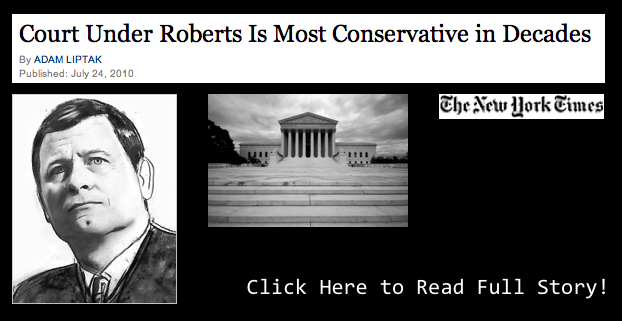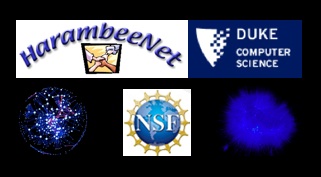The Sunday New York Times features an article by Adam Liptak assessing the conservatism of Robert Court. The article features some good coverage for some of the leading law and political science scholars who study the United States Supreme Court. Well worth the read!
–
ICPSR 2010 Summer Program — Introduction to Computing for the Study of Complex Systems
This summer I will be teaching a summer course entitled Introduction to Computing for the Study of Complex Systems at the ICPSR Summer Program in Quantitative Methods. For those not familiar, ICSPR has been offering summer classes in methods since 1963. The Summer Program current features dozens of courses including basic and advanced econometrics, bayesian statistics, game theory, complex systems, network analysis, quantitative analysis of crime, etc.
The Complex Systems Computing Module runs together with the Complex Systems lectures offered by Ken Kollman (Michigan), Scott E. Page (Michigan), P.J. Lamberson (MIT-Sloan) and Kate Anderson (Carnegie Mellon). Here is the syllabus for the lecture.
The first computing session is tonight from 6-8pm at the ICPSR Computer Lab. If you click here or click on the image above you will be taken to a dedicated page that will host the syllabus and course slides! Note: The slides and assignments will not be posted until the conclusion of each class.
Julian Assange: Why the World Needs WikiLeaks [ TED 2010 ]
Love it or hate it … WikiLeaks has been in the news quite a bit lately. In this TED talk, Founder Julian Assange sits down with Chris Anderson to discuss WikiLeaks. From the talk description … “The controversial website WikiLeaks collects and posts highly classified documents and video. Founder Julian Assange, who’s reportedly being sought for questioning by US authorities, talks to TED’s Chris Anderson about how the site operates, what it has accomplished — and what drives him. The interview includes graphic footage of a recent US airstrike in Baghdad.”
Estimating U.S. Government Subsidies to Energy Sources (02-08) [From Environmental Law Institute]
Click above to access visual and for the Full Report entitled Estimating U.S. Government Subsidies to Energy Sources: 2002-2008 click here! [HT: Barry Ritholtz @ The Big Picture]
The Evolution of FCC Lobbying Coalitions [Pierre de Vries]
The Journal of Social Structure is currently running an online visualization symposium that I would suggest checking out. Among the broader set of offerings, the readers of this blog might be particularly interested in Pierre de Vries‘ work on the evolution of lobbying coalitions. Anyway, for those who want to learn more about the FCC lobbying project — check out the slide show above!
Oklahoma’s Infamous Ballot Initiative – State Question 755 [Via the Economist]
In addition to my interests related to the theme of this blog, I have a number of ongoing projects related to American direct democracy. Thus, I will be following with interest the recent developments in Oklahoma. According to the Economist, “… Rex Duncan, a Republican member of Oklahoma’s House of Representatives has just had a measure placed on the November ballot that would ban local courts from considering sharia, or Islamic law, in their judgments.” Proponents of the measure have dubbed it the “Save our State” amendment. State Question Number 755 will ask voters to amend Section 1 of Article VII of the state Constitution to require the state courts to rely only on federal and state law when deciding cases. It forbids courts from considering or using Sharia law.
Suffice to say, the Economist was less than impressed with actions of the Oklahoma Legislature. Indeed, I have reviewed virtually every ballot initiative across every State for the past thirty years and would say even in the demagoguery laden world of American direct democracy that this represents some sort of a low point.
Iowa Electronic Markets: Who Will Win Control of the House in the 2010 Midterms?
For many years, the Iowa Electronic Markets have served as a futures market for political and economic information. As we move to the fall, the race for control of the House (and in turn the Speakership) appears to hang in the balance. The plot above offers both the current spot price as well as historic information regarding the markets’ perspective on this important race. Click here for information regarding this specific market.
Harambeenet 2010 @ Duke Computer Science Department
Today — Mike, Jon and I are at the 2010 Harambeenet Conference here in the Duke Computer Science Department. The conference is centered upon network science and computer science education. It features lots of interdisciplinary scholarship and applications of computer science techniques in novel domains. We are looking forward to an interesting couple of days of discussion!
Irrelevant Events Affect Voters’ Evaluations of Government Performance [PNAS]
In PNAS this week Andrew J. Healy, Neil Malhotra, and Cecilia Hyunjung Mo offer Irrelevant Events Affect Voters’ Evaluations of Government Performance. From the abstract: “Does information irrelevant to government performance affect voting behavior? If so, how does this help us understand the mechanisms underlying voters’ retrospective assessments of candidates’ performance in office? To precisely test for the effects of irrelevant information, we explore the electoral impact of local college football games just before an election, irrelevant events that government has nothing to do with and for which no government response would be expected. We find that a win in the 10 days before Election Day causes the incumbent to receive an additional 1.61 percentage points of the vote in Senate, gubernatorial, and presidential elections, with the effect being larger for teams with stronger fan support. In addition to conducting placebo tests based on postelection games, we demonstrate these effects by using the betting market’s estimate of a team’s probability of winning the game before it occurs to isolate the surprise component of game outcomes. We corroborate these aggregate-level results with a survey that we conducted during the 2009 NCAA men’s college basketball tournament, where we find that surprising wins and losses affect presidential approval. An experiment embedded within the survey also indicates that personal well-being may influence voting decisions on a subconscious level. We find that making people more aware of the reasons for their current state of mind reduces the effect that irrelevant events have on their opinions. These findings underscore the subtle power of irrelevant events in shaping important real-world decisions and suggest ways in which decision making can be improved.”
Benoît Mandelbrot: Fractals and the Art of Roughness [ Ted 2010 ]
Those who know me are well aware of my obsession with fractals (see here). But why listen to me when you can here from the man himself — Benoît Mandelbrot!
“A Taxonomy of Networks” New Paper on the Physics arXiv
An exciting new paper entitled “A Taxonomy of Networks” by Jukka-Pekka Onnela, Daniel J. Fenn, Stephen Reid, Mason A. Porter, Peter J. Mucha, Mark D. Fricker & Nick S. Jones just hit the Physics arXiv. I wanted to flag it for anyone who might be interested.
Here is the abstract: “The study of networks has grown into a substantial interdisciplinary endeavor across the natural, social, and information sciences. Yet there have been very few attempts to investigate the interrelatedness of the different classes of networks studied by different disciplines. Here, we introduced a framework to establish a taxonomy of networks from various origins. The provision of this family tree not only helps understand the kinship of networks, but also facilitates the transfer of empirical analysis, theoretical modeling, and conceptual developments across disciplinary boundaries. The framework is based on probing the mesoscopic properties of networks, an important source of heterogeneity for their structure and function. Using our method, we computed a taxonomy for 752 individual networks and a separate taxonomy for 12 network classes. We also computed three within-class taxonomies for political, fungal, and financial networks, and found them to be insightful in each case.”
Sunbelt Social Networks Conference 2010 – Riva Del Garda
Next week Mike and I will be in Italy for Sunbelt 2010 in Riva Del Garda. Sunbelt features scholars from across the social and physical sciences — Mathematical Sociology, Political Science, Economics, Organization Studies as well as Physics and Applied Math. For those of you attending, we looking forward to seeing you in Italy!
John Underkoffler Points to the Future of UI [ Ted 2010 ]
“When Tom Cruise put on his data glove and started whooshing through video clips of future crimes, how many of us felt the stirrings of geek lust? This iconic scene in Minority Report marked a change in popular thinking about interfaces — showing how sexy it could be to use natural gestures, without keyboard, mouse or command line. John Underkoffler led the team that came up with this interface, called the g-speak Spatial Operating Environment. His company, Oblong Industries, was founded to move g-speak into the real world. Oblong is building apps for aerospace, bioinformatics, video editing and more. But the big vision is ubiquity: g-speak on every laptop, every desktop, every microwave oven, TV, dashboard. ‘It has to be like this,” he says. “We all of us every day feel that. We build starting there. We want to change it all.’ Before founding Oblong, Underkoffler spent 15 years at MIT’s Media Laboratory, working in holography, animation and visualization techniques, and building the I/O Bulb and Luminous Room Systems.”










